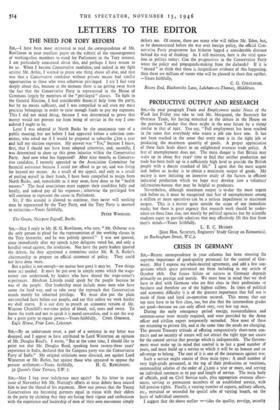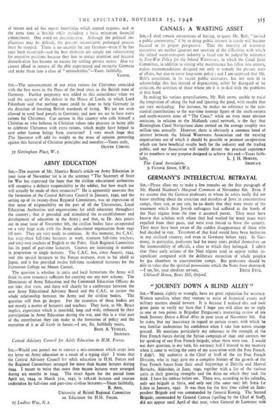CRISIS IN GERMANY
SIR,—Recent correspondence in your columns has been stressing the supreme importance of good-quality personnel for the control of Ger- many. May I express my whole-hearted agreement, and add a few sug- gestions which space prevented me from including in my article of October 18th. Our future failure or success in Germany depends primarily on prestige and morale. We must bear in mind that we shill have to deal with Germans who are first class in their professions or business and therefore are of the highest calibre. In times of political and economic difficulty it is of the greatest importance that full use is made of them and loyal co-operation secured. This means that our top men have to be first class, too, but also that the intermediate grades are good—because we can only afford very, very few top men.
During the early emergency period energy, resourcefulness and common-sense were mainly required, and were provided by the Army officer and civilian expert temporarily seconded. Now most of these are returning to private life, and at the same time the needs are changing. The present Treasury attitude of offering comparatively short-term con- tracts and no security of tenure will not attract the right type nor create for the control service that prestige which is indispensable. The Govern- ment must make up its mind that control is to last a good number of years, and must build up a service to which it will be an honour and an advantage to belong. The cost of it is one of the insurances against war.
Such a service might consist of three main types: A small number of very high-grade personnel, at the top of their professions or vocations, commanding salaries of the order of £5,000 a year or more, and serving on individual contracts as to pay and length of service. The main body of officials, paid on Civil Service scale, plus appropriate overseas allow- ances, serving as permanent members of an established service, with full pension rights. Finally, a varying number of experts, military officers, etc., recruited or seconded for special jobs of varying length, on the basis of individual contracts.
I suggest that the above outline nr'vides the quality, prestige, security
of tenure and ad hoc expert knowledge which control requires, and at the same time is flexible while including a basic minimum financial commitment. One word on denazification. Although the political im- plications may be difficult, the present interminably prolonged process must be stopped. There is no security for any German—even if he has once been examined—and the best elements are simply not volunteering for executive positions because they fear to attract attention and because denazification has become an excuse for settling private scores. Also we cannot afford to remove all the able experienced and energetic Germans and make them into a class of " untouchables."—Yours faithfully,
VIATOR.



































 Previous page
Previous page